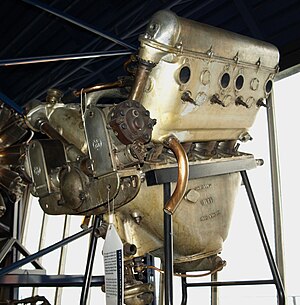Wolseley Viper
| Viper | |
|---|---|

| |
| Rear view of preserved Wolseley Viper | |
| Type | Piston inline aero-engine |
| Manufacturer | Wolseley Motors |
| First run | 1918 |
| Major applications | Royal Aircraft Factory S.E.5 |
The Wolseley Viper is a British-built, high-compression derivative of the Hispano Suiza HS-8 liquid-cooled V-8 engine, built under licence by Wolseley Motors during World War I.
It powered later models of the S.E.5a, SPAD VII and other British or British-built aircraft designed for the Hispano-Suiza.
Variants
- Wolseley W.4A Python I (1917)
- 150 hp (110 kW) – licence produced version of the Hispano-Suiza 8Aa with minor structural changes and the weight increased to 455 lb (206 kg), retained the original's low compression 1.8 in (45 mm) pistons and compression ratio of 4.7:1. Only 100 built.[1][2]
- Wolseley W.4A Python II
- 180 hp (130 kW) – high compression version of the Python I with high compression 2 in (50 mm) pistons and compression ratio increased to 5.3:1.[2]
- Wolseley W.4A* Viper (1918)
- 200 hp (150 kW) – broadly the equivalent of the Hispano-Suiza 8Ab, compression ratio of 5.3:1 (19 early production engines had a higher compression ratio of 5.6:1), with 200 hp English Hispano propeller hubs.[3]
- Wolseley W.4B Adder I (1918)
- Wolseley W.4B* Adder II
- 200 hp (150 kW) – modified and improved version of the Adder I.[3]
- Wolseley W.4B* Adder III
- 200 hp (150 kW) – modified and improved version of the Adder II with balanced crankshaft.[3]
Applications
- Airco DH.9
- Avro 552
- Bristol M.R.1
- Bristol Tourer
- Cierva C.8
- Martinsyde F.6
- Royal Aircraft Factory S.E.5a
- Sopwith Antelope
- Sopwith Cuckoo
Surviving engines
A Wolseley Viper powered Royal Aircraft Factory S.E.5a is owned by, and on display at The Shuttleworth Collection, Old Warden Aerodrome in the UK.[5]
Engines on display
- A preserved Wolseley Viper is on public display at the Science Museum, London.
- A preserved Wolseley Viper is on public display at the Museo Nacional de Aeronáutica de Argentina
Specifications (W.4A Viper)
Data from Gunston[1] and Lumsden[3]
General characteristics
- Type: 8-cylinder, upright, 90 degree Vee engine
- Bore: 4.72 in (120 mm)
- Stroke: 5.12 in (130 mm)
- Displacement: 716.8 cu in (11.7 L)
- Length: 46.2 in (1,170 mm)
- Width: 33.5 in (850 mm)
- Height: 35.4 in (900 mm)
- Dry weight: 455 lb (206 kg)
Components
- Fuel system: Twin Zenith-Duplex carburettors
- Cooling system: Liquid-cooled
- Reduction gear: Direct drive, Right-hand tractor
Performance
- Power output: 200–210 hp (150–160 kW)
- Compression ratio: 5.3:1
See also
Related development
Comparable engines
Related lists
References
Notes
- ^ a b Gunston (1986), p. 76.
- ^ a b Lumsden (1994), pp. 156 & 232.
- ^ a b c d e Lumsden (1994), p. 232.
- ^ Gunston (1986), p. 171.
- ^ The Shuttleworth Collection - SE5a Archived 23 July 2019 at the Wayback Machine www.shuttleworth.org Retrieved: 09 March 2017.
Bibliography
- Gunston, Bill (1986). World Encyclopaedia of Aero Engines. Wellingborough: Patrick Stephens Ltd. ISBN 0-85059-717-X.
- Lumsden, Alec (1994). British Piston Engines and Their Aircraft. Shrewsbury: Airlife Publishing Ltd. ISBN 1-85310-294-6.
